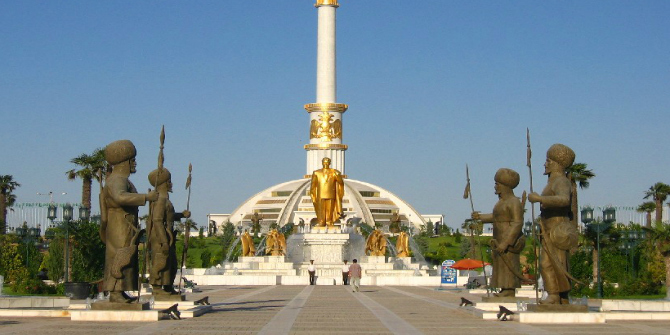In General Intellects: Twenty-One Thinkers for the Twenty-First Century, McKenzie Wark reworks the figure of the public intellectual through the notion of the ‘general intellect’, showcasing 21 key thinkers including Donna Haraway, Amy Wendling and Kojin Karatani. With these bite-sized introductions adding up to more than the sum of their parts, this is a book filled with minor revelations that provides subtle shifts on known works and identifies new paths for understanding the contemporary world, writes Andrew Molloy.
General Intellects: Twenty-One Thinkers for the Twenty-First Century. McKenzie Wark. Verso. 2017.
‘Where are the public intellectuals like we used to have back in the good old days?,’ asks McKenzie Wark in the opening line of General Intellects: Twenty-One Thinkers for the Twenty-First Century. Lurking behind this provocative question is the uncertain role of contemporary academia within a post-truth landscape where experts and intellectuals are treated with suspicion or outright disdain. Over the course of the book’s 21 chapters, Wark doesn’t rebuild the figure of the long lost public intellectual, but instead recasts the potential role of the intellectual worker within the dramatically different and difficult context of the contemporary world. In doing so, not only does he provide a showcase for 21 thinkers – referred to as ‘general intellects’ as opposed to public intellectuals – but also succeeds in building a picture of a coherent ‘general intellect’: an understanding of how we are in the world and how we can live better.
The term ‘general intellects,’ Wark explains, is drawn from a text by Karl Marx found in the Grundrisse, used to describe the ideas behind the development of the ‘dead labour’ of the machine. Indeed, the methodologies and thought patterns of Marx and his intellectual descendants loom large within the text, although these are deployed in strikingly novel ways. In this re-interpretation of Marx, the role of the intellectual has not diminished due to the failings of contemporary practitioners but is rather attributed to the nature of the commodification of ideas and information that has disconnected it from the labour process. If information we give away for free – e.g. through social media – can be monetised, where does that leave the public intellectual/general intellect? The practitioners examined are described as workers whose labour involves the production and commodification of ideas, but who ‘try to find ways to write and think and even act […] against this very system of commodification’ (3).
Working in this tradition, Wark’s examination of Marx in his introduction foreshadows his treatment of the ‘general intellects’ in the chapters that follow. ‘Marx’, he explains, ‘was not a philosopher’ (5). Where Marx permitted phenomena in the world – namely, industrial labour – to shape his ideas, Marxists appear to do the opposite. Similarly, Wark’s ideas are firmly planted in the problems of our time – hyper-capitalism, over-consumption and climate change are common motifs throughout – and the works of the 21 thinkers are used to develop positions on the nature of the human condition in the shadow of these ongoing natural and social disasters.
 Image Credit: (Neil Conway CC BY 2.0)
Image Credit: (Neil Conway CC BY 2.0)
What emerges is a distinct methodology. In the closing chapter, which looks at Donna Haraway, Wark explains that ‘a good fact is mostly true about something in particular; a good theory is slightly true about a lot of things’ (324). As such, the chapters are condensed versions of the practitioner’s key works with their concepts extracted from their particular context and used to enhance their contribution to the general.
Similarly, the opening chapter – centred upon Amy Wendling – contains a telling re-reading of Marx. This is based on Wark’s assertion that, when read as high theory, Marx is inadequate for challenging the problems of our time in that the commodification of the general intellect is dramatically different from the commodification of labour to which Marx was responding. Read instead as methodological approach, Marx can be seen to be ‘performing’ – to use Wendling’s terminology – previous philosophical works, either updating them for the fluctuating times in which he found himself or wresting them from their philosophical context and placing them within another to see how their meaning shifts. Wark describes this as a form of détournement – a term extracted from fellow post-Marxist Guy Debord about whom Wark has written extensively in the past – ‘which works by appropriating elements from different information sources and holding them in tension against each other’ (16). As Wark has also described this as ‘the refusal of intellectual property’, this re-reading of Marx is key to expanding and continuing his intellectual project in a way relevant to this new mode of production.
These methodologies are developed throughout the book, with the ‘general intellects’ cut against and mapped on to each other. For example, the chapter following that on Wendling, focusing on Kojin Karatani, demonstrates how the philosopher and literary critic himself attempts to extend the Marxist project by conceiving of the history of the world not as a history of modes of production, but rather as ‘a history of modes of exchange’ (31). In identifying three such modes of exchange – Mode A: association or reciprocity; Mode B: brute force or the state; and Mode C: commodity exchange or capital – Karatani asks what if Marx turned his attention to the former two, as opposed to just capital? This speculative leap – or is that détournement? – leads to a dizzying explanation of how these modes, perhaps easily conceived of as a progression, form a complex conceptual framework in which all three are occurring at once. While clan culture (indicative of mode A) was followed by the formation of states (indicative of mode B), in turn followed by global capitalism (indicative of mode C), the development of one does not replace that which proceeded it. Indeed, each one relies on the existence of the other, and when one of these modes is denied, an imbalance is created. ‘In the process of empire formation, there is a moment when, under the sway of mode of exchange B, mode of exchange C dismantles mode of exchange A’ (41). This creates new mode of exchange D which transcends the others: universal religion.
In this discussion Wark has taken two concepts, extracted and generalised from the work of two academics, and has gently rubbed them together to create a new intellectual apparatus for interrogating the world. This methodology permits Wark throughout the arc of the book to provide subtle shifts in the reader’s perspective on well-known canonical texts (including by Marx, Pier Paolo Passolini, Jean-Paul Sartre and many others) as well as identifying fresh paths through the horrific spectacle of contemporary life. At the end of all 21 chapters, the accumulative effect of these minor revelations equates to much more than the sum of their parts. General Intellects: Twenty-One Thinkers for the Twenty-First Century, therefore, not only provides succinct bite-size introductions (around 3000-4000 words each) to 21 important contemporary theorists, but also the ability to take this methodology and apply it yourself to whatever aspect of modern life troubles you the most.
Dr Andrew Molloy received his doctorate from Ulster University in 2017. Over the course of his DPhil he developed a practice-based mixed methodology allowing the city to be considered as a process rather than a product. In developing a non-ideological approach to urbanism highlighting the importance of tacit poetic interpretations when it comes to spatial understanding, Andrew both examined a series of mappings of his home city of Belfast and attempted to map the city himself. Andrew is currently undertaking his professional studies to become a chartered Architect. Read more reviews by Andrew Molloy.
Note: This review gives the views of the author, and not the position of the LSE Review of Books blog, or of the London School of Economics.


 Find this book:
Find this book: 



